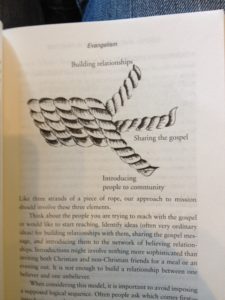
Christians disagree with whether there is a specific spiritual gift of evangelism somehow distinct from the office of evangelist or apostle (Ephesians 4:11). (Here’s one such article.) Regardless of one’s interpretation, it is certain that all Christians are called to be witnesses for Christ and to make disciples (Matthew 28:18-20, Acts 1:8). However, each of us have different ways and means of sharing our faith with others. Chuck Smith wrote in Why Grace Changes Everything:
“There are people who are thrilled to talk to strangers. They get bored just sitting at home and they can’t wait to strike up conversations with people they’ve never met. That is their nature. It’s natural for them—and that is the key… Not everybody in the body is the mouth, however, and the mouth couldn’t operate effectively unless there was a brain behind it and feet to carry it where it needed to go. We should not feel guilty because we do not have the same ministry or effectiveness as others. The body works as a unit, and God is the one who has assigned each of us our place in the body…
“When you are doing what you love to do, it is not a work. You are not in a shop. You are not laboring in a factory. Your activity is the fruit of relationship. When the love of God fills your heart, all you want to do is talk about Him: His Word, His goodness, His love. You don’t go around looking for brownie points just because you have been doing what you like to do. You don’t look to be rewarded for what is natural to you (even though God will reward you for the fruit that comes forth from your life). You do it because you want to do it, because it is your nature to do it, because God has put it in your heart to do it. The fact is, you feel as if you would die if you didn’t do it…” (ch. 6).
I found that to be an encouraging word. I’m not one itching to go out and talk to strangers, but I must write my blogs, and I live and love to share my faith and the truths of Scripture in this way. Other people would rather do anything but write.
Evangelism can become burdensome if we think it has to be done a certain way or we have to meet certain goals. We may get discouraged if we find ourselves unable to do it the “right way” or fail to say what we think we should. Or conversely some people may become proud if they find great success and wonder why others struggle so much with it. Despite repeated reminders of God’s grace toward us, I think we all are inclined to drift back into legalism when it comes to any of the spiritual disciplines. In his book Seculosity, David Zahl wrote:
“The law classifies and categorizes. It tells us clearly and confidently where we stand… [A] religion of law promises functional salvation to those who live up to its demands, expressed more often than not in the should’s and ought’s we infer from our shared ideals… There’s a fundamental problem with all religions of law, in whatever form we encounter them. The problem does not reside in the content of the law itself. The problem resides in the human heart: knowing what we should do or be does not give us the ability to do or be those things… The law never has and never will inspire what it commands, at least not in any comprehensive or lasting sense” (164-165).
“What makes Christianity a religion of grace, ultimately, is its essential revelation: of a God who meets us in both our individual and collective sin with a love that knows no bounds, the kind of love that lays down its life for its enemies. It is not a roadmap to engineering spiritual enoughness but the glorious proclamation that on account of Christ, you and I are enough—right now, right here, before we do or say anything. That is to say, Christianity at its sustaining core is not a religion of good people getting better, but of real people coping with their failure to be good” (176).
Christ has already met all the demands of the law for us. There is nothing we must do to gain His approval. If our motivation for evangelism is a desire to measure up to some standard, whether our own or someone else’s, it will not last long and probably won’t bear any real fruit. Bob George commented in Classic Christianity,
“After having led hundreds of people to Christ as a businessman, I found myself losing interest in talking to people about the Lord… [When] you have lost the joy of your salvation and have begun sharing Christ out of habit, competition, or just plain duty, there is no relish in it and not much to keep you going. After all, what can you say? ‘Become a Christian and be miserable like me’? …What was once the overflow of my experience of God’s love had become just an external performance. I was totally committed to God’s plan, true—but I had strayed from the God of the plan… Well, I was tired of it… I’m no longer trying to change the world or anything else. I am content to let God work through me to produce whatever results He pleases” (27-28).
Our church has had some helpful training on evangelism this summer, but some people like me may be feeling a false sense of guilt for what we’re not doing and perhaps don’t desire to do. The good news is that God loves us and will continue to love us even if we never say another word. Our role as branches is simply to abide in the Vine (John 15). We don’t have to work at producing fruit, but if we are abiding in Him the fruit will come as He works in and through us. (However, if there is no fruit and no desire to produce fruit, one should question whether they are actually attached to the Vine at all.)
He doesn’t call any of us to be Billy Graham or Charles Spurgeon. He already worked through them. He calls me to be me, and you to be you, each of us with our unique personalities and gifts. I share my faith in the ways that are most natural and enjoyable to me. My way is not your way and my words are not your words. Saving faith is ultimately the work of the Holy Spirit. God doesn’t need any of us to work for Him, but He will produce fruit through all who truly belong to Him.
“Abide in Me, and I in you. As the branch cannot bear fruit by itself, unless it abides in the vine, neither can you, unless you abide in Me. I am the vine; you are the branches. Whoever abides in Me and I in him, he it is that bears much fruit, for apart from Me you can do nothing” (John 15:4-5 ESV).
“I planted, Apollos watered, but God gave the growth. So neither he who plants nor he who waters is anything, but only God who gives the growth” (1 Corinthians 3:6-7).
© 2019 Dawn Rutan. Image copyright free from pixabay.com. The opinions stated do not necessarily reflect the views of my church or employer.






